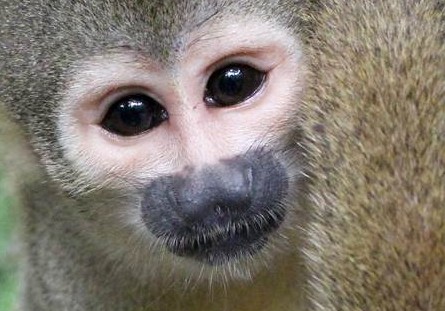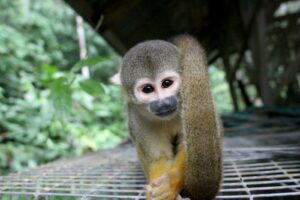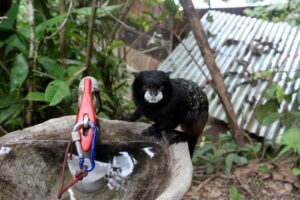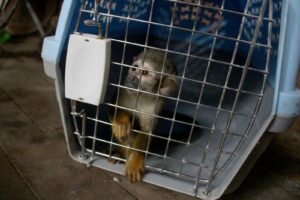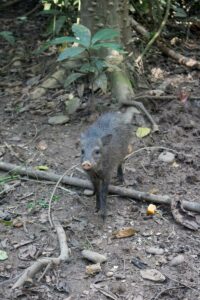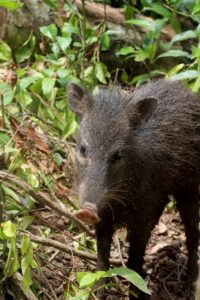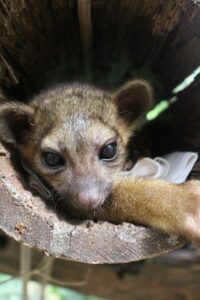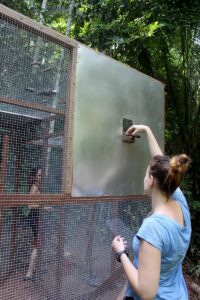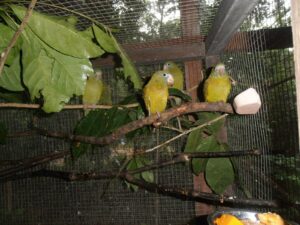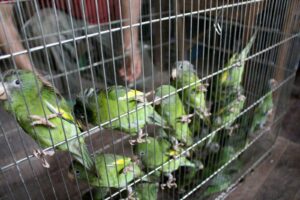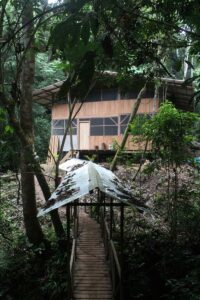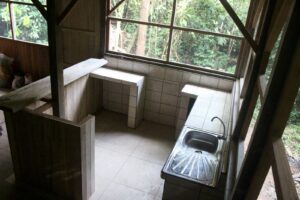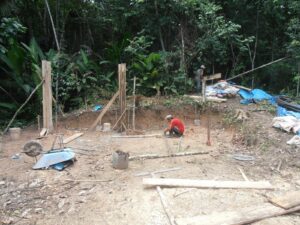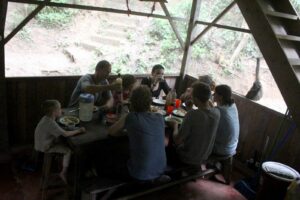GENERAL INFORMATION
The weather is mostly gloomy recently. Rainy season seems to have finally lived up to its name. Frequent showers and thunderstorms also bring up the population of the mosquitoes. While humans suffer, the animals cheer, as it is now also the prime time of fruit ripening in the jungle. Increased animal activity has been witnessed everywhere. From the last forest walk alone the volunteers have spotted howler monkeys, white and brown capuchin monkeys and some others.
ANIMALS
- Monkeys
To our pleasant surprise, the severely injured leg of Camila, one of our female squirrel monkeys, has greatly improved. After several weeks in a cage, she was recovered enough to be released again. Despite the fact that the leg is not functioning the same as it used to and probably never will, it doesn’t seem to bother Camila much. During the day, she is still jumping around in the trees and catching grasshopper snacks. As before, at night she snuggles up together with the capuchin monkeys (Mica and Jordi) in the gutter of the volunteer house to sleep.
Alessi, the female tamarin, completely recovered from her minor injury and was released again. One night recently she, together with Shambito the young male, decided not to return to their cage to sleep and instead spent the night in the monkey house (which we built almost a year ago to keep monkeys out of the guttering of the house!). It was their first night out and a remarkable progress for their release.
A new baby monkey joined the family in these recent weeks, together with 46 white winged parakeets, and 1 tortoise, who were all confiscated by the police and brought to us by the Ministry of Fauna and Flora. The young squirrel monkey, named Louie, is estimated to be 3 to 4 months old. At first we had him quarantined in a cage in the office, but after his first deworming treatment we could place him in one of the outside cages. He is an active little guy and seems eager to get out and have contact with the rest of the monkey group. However this will not be for another week or so, when his quarantine period is over.
- Other mammals
There are joyful moments and there are tears. To our grief, the young female peccary, Xena, has died of acute internal bleeding possibly caused by the burst of an ulcer near a major blood vessel in her intestines. The morning before she was active, eating and all seemed fine. After her autopsy, she was buried in the forest. Quintisha needed some extra attention as she did not seem to be her normal self. She is fine now, but of course lonely for a group animal.
Our beloved kinkajou, Cushna, has disappeared. She was at the kitchen window as usual one night and gone the next. Sadly we have not seen her since. We would love to believe she is fine and happy, but in this case, with her being fairly tame, we fear for the worst. After a week of opening her cage at night and putting food out, we had to give up. We of course still hope that she might be alive somewhere out there in the rainforest.
- Reptiles
The newly arrived tortoise has some infection caused by fungus on its shell. It will be quarantined and treated until it is fine to join the other tortoises or to be released.
- Birds
We decided that the parakeets by the managers house were ready for release. Therefore a small window was opened on their cage. It is designed so that only the birds which can fly can go through the opening. Yet the birds seem to lack interest in freedom, as so far to our knowledge only one parakeet has ventured outside the cage. Maybe more of them will become curious in time and find their way out to join the wild group which often is seen flying by.
Since they have been in there, we have had to take several out due to injuries, some with broken legs. All these birds were the ones who still had cut or newly growing feathers, so could not fly. We decided to take all of these birds out again and separate them in a different cage, except for Pichu, the white-eyed parakeet (aratinga). He can’t fly but he might be the cause of the injuries. At the moment 6 parakeets are still recovering in a cage in the office.
The baby bird, Supay, determined as a shiny cowbird, is now living in a cage next to the volunteer house. There he has more space and is jumping around all day taking his first lessons in flying. He is getting better and better at killing grasshoppers and starts to pick up food from his bowl by himself. His feathers are getting much like an adult bird now.
The newly arrived 46 parakeets were weighed, checked and then all brought to an enclosure outside. All are not able to fly due to cut feathers, mostly only on their left wing. After some time in the new cage, we took 3 out, which seemed to be weaker than the rest and placed them in a small cage in the office, for special treatment. The rest all seemed to be really hungry in their first days at Esperanza Verde, devouring every single piece of food we were providing. This we see very often with new arrivals. It seems that they were deprived of food and water for some days before.
FOREST
After some heavy rainfalls, the seeds are sprouting all over the forest. Machico found a lot of Ceder seedlings under a single mother tree (apparently there was no wind to take them further). Ceder is a species which through logging has disappeared out of most of the region. Machico and Geiler (our permanent staff) placed around 1200 in bags to be able to plant them on better spots (old clearings and former plantations). When the seedlings are planted, their coordinates will be taken and put into the reforestation database.
CONSTRUCTION
The manager’s house is really close to completion now. The inside walls are being painted and all that remains is to install the fine wire mesh against the mosquitos before the family can move in. Of course there will still be a lot of work to be done in the house, like shelves, tables, more painting etc., but as more beds are needed in the volunteer house, the family will move in in the coming weeks.
At the same time the construction of the clinic has started. The first posts of cement have been set, and bricks are on their way. The arrival of the bricks has been somewhat slowed by a damaged bridge on the way from Curimana to us; until it is fixed trucks are unable to get to our remote location. However the wood for the roof construction has arrived and we hope the river will grow again so we can move it closer by boat. If not it will take some effort of all to carry them from the port to the clinic site on foot.
VOLUNTEERS
On one evening recently the stream in front of the volunteer house rose to a height not often seen. We started to get a bit worried, as when it happened in the past the water eventually rose so high that it eventually came into the house. After dinner the water had almost approached the base of the house. We store wood for construction under the house so we decide it was best to move it to a higher location. Everybody took part in rescuing the wood. Our flashlights lit the way and booming music kept everyone awake and in high spirits. However the evening did not end with the labor and sweat. Beers were fetched from the local village and the laughter and music echoed through the jungle into the night. Luckily the water started to withdraw around midnight so there was no need to evacuate the house that night. Although the water stayed high the next day (the canoe could be driven directly to the back of the volunteer house) it never got close to the house again.
The supplies and cooking ingredients can be limited in such an isolated rescue center in the rainforest, but with the high creativity of the volunteers we are still being spoiled. We have had many desserts lately: apple crumbles, banana cake, carrot cake, short bread, flapjack, rice pudding, and chocolate cake. One fantastic meal is followed by another. It seems that jungle life is also a good opportunity to improve one’s culinary skills.
Life is never boring at Esperanza Verde, especially with the growing population of mosquitoes lately. Killing mosquitoes has become one of our additional daily activities here — next to being harassed by the monkeys, catching grasshoppers for Supay, throwing the cat out of the kitchen, and hearing Yara, the dog, barking in the early morning. Annoying as it seems, it does not hinder the fun at Esperanza Verde one bit. Playing cards, hosting movie nights with homemade popcorn, relaxing with cocktails, gazing at countless stars in the clear sky, bathing at the waterfall, fishing in the muddy jungle river, working with our amazing animals, and encountering endless new wild animals, life is as ever delightful and fascinating. The chattering of the animals and endless greenery constantly surrounds us.

